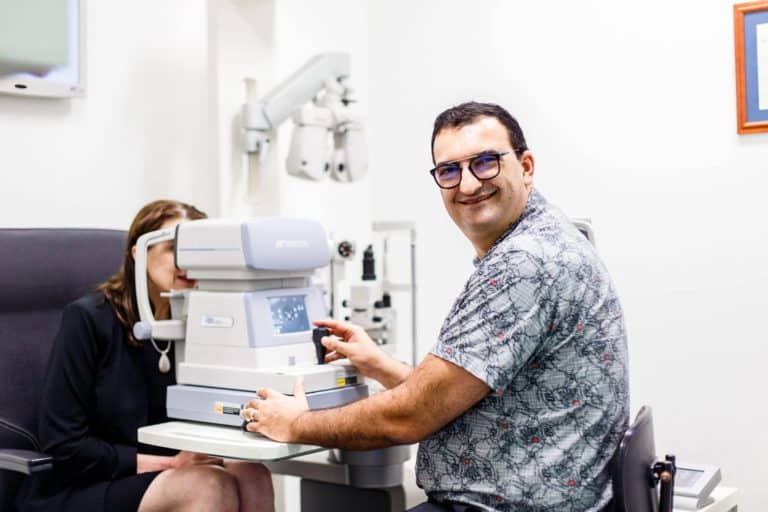When considering eye care, many individuals frequently ask themselves, “Is obtaining a referral necessary to consult with a behavioural optometrist?”
You may also find yourself pondering other relevant questions, such as “What particular signs should prompt a visit to a behavioural optometrist?”, “How do I select the most appropriate practitioner for my specific needs?”, and “What can I anticipate during my appointment?”
Whether you are facing vision-related challenges or are eager to enhance your visual performance, understanding how to access behavioural optometry services is essential. In this discussion, we will delve into these queries in depth to dispel any uncertainties.

Understanding the Referral Process for Behavioural Optometry Services
To clarify the primary concern: in most situations, you DO NOT need a referral to schedule an appointment with a behavioural optometrist. These specialists are regarded as primary eye care providers, allowing you to directly arrange a visit without the prerequisite of consulting another healthcare professional.
However, there are specific circumstances where a referral may be advantageous:
Integrated care approach: If you are undergoing treatment for associated issues such as learning disabilities or neurological conditions, your current healthcare provider might recommend a behavioural optometrist as part of a comprehensive treatment strategy.
Complex cases: In certain situations, if you possess a complicated medical history or distinct eye conditions, your general optometrist or ophthalmologist may advise a referral to a behavioural optometrist for more specialized attention.
While these scenarios do exist, they are not the standard practice. Most individuals can opt to see a behavioural optometrist without needing a formal referral.
At Eyes by Design, we accommodate both direct appointments and referrals, ensuring that anyone seeking our specialized services can access the care they require without unnecessary obstacles.
Identifying the Signs That Indicate a Need for Behavioural Optometry Consultation
Recognizing the right moment to seek help from a behavioural optometrist is vital. Although referrals are typically unnecessary, it's crucial to be mindful of the signs that suggest you could benefit from behavioural optometry services. You should consider scheduling an appointment if you or your child are facing:
- Persistent difficulties in reading: Experiencing challenges with reading speed, comprehension, or frequently losing your spot can signal the need for professional assistance.
- Eye strain or headaches: These symptoms frequently occur during close-up activities like reading or using a computer and may indicate underlying issues.
- Poor performance in sports: If you struggle to judge distances or track moving objects, a consultation with a behavioural optometrist could provide valuable insights.
- Issues with attention and concentration: Difficulty focusing on visual tasks or becoming easily distracted may suggest the necessity for specialized care.
- Coordination challenges: Difficulties with hand-eye coordination or general clumsiness can often be addressed through behavioural optometry.
- Visual discomfort post screen time: Experiencing fatigue, blurred vision, or discomfort after using digital devices is a common issue.
- Learning challenges: If a child encounters academic obstacles despite being intelligent and putting in effort, considering a behavioural optometry evaluation may be beneficial.
- History of head injury or concussion: If visual symptoms persist following head trauma, seeking expert evaluation is crucial.
- Diagnosed conditions like dyslexia or ADHD: These conditions often correlate with visual processing challenges that a behavioural optometrist can effectively address.
- Ongoing symptoms despite normal eye exams: If conventional optometry has not resolved your visual concerns, further assessment may be warranted.
- Visual demands specific to your career: Professions that require exceptional visual skills, such as pilots, athletes, or surgeons, may necessitate a visit to a behavioural optometrist.
- Developmental concerns: For children who are lagging in visual-motor skills, early intervention can be incredibly beneficial.
It’s crucial to remember that you don’t have to wait for a referral to address these concerns. If any of these signs resonate with you, feel free to reach out directly to a behavioural optometrist, such as myself, at Eyes by Design for a thorough eye assessment.
Empowering Yourself for Better Eye Care Through Self-Advocacy
While referrals are usually not necessary for behavioural optometry, the importance of self-advocacy in eye care cannot be overstated. As a patient, you possess both the right and the obligation to pursue care that effectively tackles your visual needs. Here’s why self-advocacy is vital:
- Personalized care: You are the most knowledgeable about your symptoms and concerns. By actively seeking specialized care, you ensure that your individual needs are properly addressed.
- Timely intervention: Delaying treatment while waiting for a referral can lead to unnecessary complications. Self-advocacy enables you to access the necessary care more promptly.
- Comprehensive approach: Behavioural optometrists provide a holistic perspective on vision care that transcends standard eye exams.
- Empowerment: Taking control of your eye health decisions fosters greater engagement and responsibility in your healthcare journey.
- Awareness: By researching and selecting a behavioural optometrist, you enhance your understanding of your options for maintaining visual health.
- Preventive care: It’s crucial not to wait for vision problems to escalate. Proactively visiting a behavioural optometrist can help detect issues early.
At Eyes by Design, we encourage our patients to take an active role in their vision health. If you believe that behavioural optometry could be advantageous for you, please don’t hesitate to contact us directly. We are here to support your journey toward optimal visual health and performance.

Essential Factors to Consider When Selecting Your Ideal Behavioural Optometrist
Since a referral is typically not necessary, the responsibility of selecting the right behavioural optometrist rests with you. Here are several key factors to consider:
- Credentials: Ensure that the optometrist has undergone specific training and holds certification in behavioural optometry.
- Experience: Seek out a practitioner with a demonstrable history of successfully addressing your specific concerns.
- Technology: Opt for a practice that employs the latest technology for assessments and treatments, ensuring the highest standards of care.
- Approach: Choose an optometrist whose treatment philosophy aligns with your personal healthcare beliefs and objectives.
- Communication style: Select a practitioner who communicates clearly and listens attentively to your concerns.
- Location and accessibility: Consider the convenience of the practice’s location and the flexibility of their office hours.
- Patient reviews: Read testimonials or ask for references from current patients to gauge the quality of care offered.
- Medicare, Health Insurance, and Costs: Be aware of which services Medicare and your health insurance cover, along with any potential out-of-pocket expenses.
- Specializations: Some behavioural optometrists may concentrate on particular areas, such as pediatrics or sports vision, which could be noteworthy for your needs.
- Collaborative care: If you have other health concerns, select an optometrist open to collaborating with your other healthcare providers.
At Eyes by Design, we strive to meet all these criteria by delivering expert care, cutting-edge technology, and a patient-centered approach. We encourage prospective patients to ask questions and ensure they feel comfortable before scheduling an appointment.
What to Anticipate During Your First Visit to a Behavioural Optometrist
Understanding what to expect during your initial visit can alleviate any anxiety surrounding the experience. Here’s a typical process you can expect at Eyes by Design:
- Comprehensive history: We’ll discuss your visual concerns, overall health, and lifestyle factors that may impact your vision.
- Standard eye exam: This includes tests for visual acuity, refraction assessments, and evaluations of eye health.
- Specialized testing: We will evaluate various aspects of visual function, including eye teaming, tracking, and focusing capabilities.
- Functional vision evaluation: This may involve tests designed to simulate real-world visual tasks.
- Visual processing assessment: We’ll analyze how your brain interprets visual information, which is vital for effective vision.
- Discussion of findings: We’ll explain our observations and how they relate to your specific symptoms or concerns.
- Treatment recommendations: Based on our findings, we’ll suggest a personalized treatment plan tailored to your needs.
- Questions and answers: We encourage you to ask questions and express any concerns regarding our findings or recommendations.
- Next steps: We’ll outline the proposed treatment process and schedule follow-up appointments if necessary.
Remember, this process is not solely about evaluating your eye health; it’s also about enhancing your overall visual performance and improving your quality of life. Come prepared with questions and be ready to engage actively in your care.
The Critical Role of Behavioural Optometry in Supporting Your Overall Health
Behavioural optometry plays a vital role in enhancing your overall health and well-being in numerous ways:
- Cognitive function: Clear vision is essential for effective learning and information processing.
- Physical health: Vision problems can contribute to poor posture and physical strain, adversely affecting overall health.
- Mental health: Vision difficulties can lead to increased anxiety and diminished self-esteem.
- Productivity: Optimal visual function is crucial for both work and academic success.
- Quality of life: Achieving clear and comfortable vision enhances daily activities and social interactions.
- Safety: Good vision and effective visual processing are crucial for safe activities, such as driving.
- Social interaction: Visual cues play a significant role in non-verbal communication, impacting relationships.
- Preventive care: Early intervention can help prevent the progression of vision problems, safeguarding your long-term health.
By thoroughly addressing visual function, behavioural optometrists make significant contributions to overall health and well-being. This comprehensive approach emphasizes the importance of seeking specialized care whenever necessary, irrespective of whether a referral is involved.
Effective Strategies for Accessing Behavioural Optometry Services
While a referral is generally not needed to consult a behavioural optometrist, knowing when and how to access this specialized care is critical. At Eyes by Design, we are dedicated to providing accessible, comprehensive vision care that extends beyond standard eye exams.
Whether you are confronting specific visual challenges or simply wish to boost your visual performance, do not let the absence of a referral deter you from seeking help. Take control of your visual health by reaching out directly to a qualified behavioural optometrist.
Keep in mind that your vision affects every aspect of your life. By opting for behavioural optometry, you are making a significant investment in your overall well-being and quality of life.
We encourage you to listen to your body, identify the signs that indicate you may need specialized care, and take proactive steps toward achieving optimal visual health.
If you have any questions or would like to schedule a routine eye exam, please do not hesitate to contact us at Eyes by Design. Your journey to improved vision begins here.
This article aims to enhance understanding and knowledge about general eye health topics.
It should not replace professional advice, diagnosis, or treatment.
Always consult your healthcare professional before incorporating this information into your health regimen.
Dr Nicholas Altuneg
For over two decades, my greatest passion has been helping people of all ages live improved lives through better vision. At Eyes by Design, vision is much more than simply seeing clearly or reading small letters from a distance; it fundamentally shapes your perceptions and reactions every moment of your day.
Read more about Dr Nick
Do You Need a Referral to See a Behavioural Optometrist? Everything You Need to Know
The Article: Referral to See a Behavioural Optometrist: Key Insights first appeared on https://writebuff.com.
The Article Behavioural Optometrist Referral: Essential Insights Was Found On https://limitsofstrategy.com
Comments are closed


This is an important topic that often gets overlooked when discussing eye care. As someone who has navigated the world of optometry, I can relate to the confusion surrounding whether a referral is needed. It’s reassuring to learn that behavioural optometrists can be accessed directly, as this encourages individuals to seek help without unnecessary barriers.
You’ve touched on a really critical point about accessibility in eye care. It’s interesting how the path to understanding which specialist to see can be so convoluted, especially when it comes to something as important as our vision. I appreciate your perspective on behavioural optometrists and how direct access can remove those barriers that often keep people from seeking help.
You’re spot on about the often-overlooked aspects of eye care and the confusion around referrals. It’s interesting how many people aren’t aware that they can go directly to a behavioral optometrist without needing that initial visit to a general practitioner. This direct access can really make a difference, especially for those who might hesitate to reach out for help due to unnecessary barriers.
Oh, the age-old question of referrals—like trying to decipher a cryptic crossword puzzle while simultaneously balancing a cup of coffee. It can feel like a rite of passage for anyone seeking to untangle the intricacies of eye care, especially when it comes to behavioural optometry. I mean, can we all just agree that our visual health should be as straightforward as ordering a double-shot caramel macchiato? But alas, life has other plans.
It’s true—navigating the world of referrals can feel like decoding an esoteric language, especially when it involves something as nuanced as eye care and behavioral optometry. You hit on an interesting point with the comparison to ordering a double-shot caramel macchiato. Sometimes all we want is simplicity, clear choices, and straightforward answers—especially when it comes to our health.
You’ve really captured the essence of what many go through when navigating the world of vision care. It is tricky, like piecing together a puzzle without having the box with the picture on it, right? You want the clarity of a straightforward path, but you often find yourself tangled in jargon, insurance rules, and the nuances of different specialties.